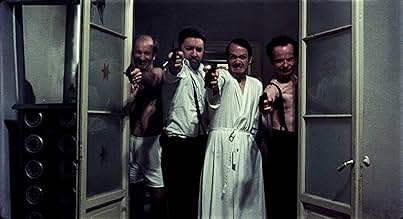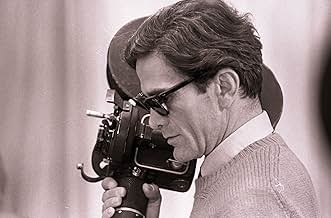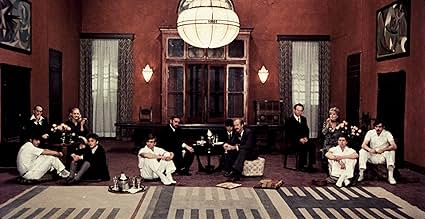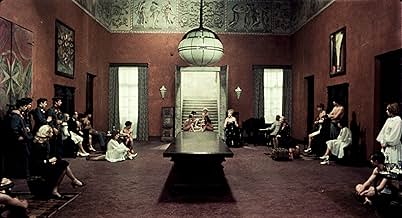
Durante la seconda guerra mondiale in Italia, quattro libertini fascisti raggruppano nove adolescenti e li sottopongono a centoventi giorni di torture.Durante la seconda guerra mondiale in Italia, quattro libertini fascisti raggruppano nove adolescenti e li sottopongono a centoventi giorni di torture.Durante la seconda guerra mondiale in Italia, quattro libertini fascisti raggruppano nove adolescenti e li sottopongono a centoventi giorni di torture.
- Regia
- Sceneggiatura
- Star
- Premi
- 2 vittorie totali
- Eccellenza
- (as Umberto P. Quintavalle)
- Signora Vaccari
- (as Helene Surgere)
Riepilogo
Recensioni in evidenza
This is the strongest movie I've ever seen, and it made an IMPORTANT impression on me, a big horrorflick-devotee. It made me question a lot of things about former favourite films, and made me realize how sick it is to make horror and violence into entertainment. The problem with most movies is that violence is not portrayed violent enough, horror isn't portrayed horrible enough. Most 'thriller' films have these ingredients softened so that people can enjoy it, and THAT'S sick. This movie is SANE. It shows horror and violence as it IS - totally revolting and disgusting.
I sat as on needles for 1 hour 40 minutes, and felt really bad watching this film. It grossed me out, but I understood why this film is both good and important. It gives a sane perspective on violence, as opposed to SICK, SICK Hollywood-action where people get killed by 'heroes' and nobody raises an eyebrow.
Inspired by 'The 120 Days of Sodom, or the School of Libertinage' by the Marquis de Sade, the film is set in Italy during WWII and follows four fascists named The Duke, The Magistrate, The President and The Bishop. Alongside their barbaric troupe of acolytes, they put a group of eighteen children through a Dantesque cycle of torture and perversion.
Completely unremitting in its' depiction of depravity and offering the viewer no respite from scenes of brutality at any point during its' runtime, the film makes for a fascinatingly violent viewing experience that is uncomfortable and unforgettable.
It may be easier to start discussing the definitive positive elements of the movie. The cinematography and shot construction is undeniably beautiful and artistic. The images on screen are strange, perverse and off-putting, but captured with style and skill behind the camera- a credit to the work of cinematographer Tonino Delli Colli. The stirring soundtrack makes effective use of pieces by Chopin, Bach and others, while Ennio Morricone's original score is haunting.
The film also benefits from having a cast full of dedicated, brave performers, whose work lingers in the mind long after the film has ended. The actors playing the four fascist libertines are all outlandishly, disgustingly terrific, with Giorgio Cataldi and Aldo Valetti being particularly memorable as The Bishop and The President respectively. As one of their accomplices, Hélène Surgère also does admirable work, but it's hard to appreciate the performances when the characters are so detestable and despicable and the actions they perform so thoroughly base.
This is the problem with the whole film actually: it's hard to appreciate because Pasolini was so committed to showing the audience nothing but cruelty. 'Salò' could be seen as an allegory about the corrupting effect of absolute power, of the extreme savagery man is capable of when they have no inhibitions, shame or empathy. By showing us nothing but repetitive scenes of torture to illustrate this theme, though, the film seems a little cursory in its' examinations of same. A cynical critic might say it's a very one-note movie, that note being one of sadism, pain and disgust.
On the other hand, one might say that it is important for artists like Pasolini to hold truth to power in their work. While the film is based on the writings of the Marquis de Sade, by updating the film to a WWII setting, Pasolini can make commentary on the barbarism of the fascists during that war.
When the allies were liberating concentration camps, lampshades made with human skin were found. The twisted, unnecessarily cruel experiments Dr. Josef Mengele performed on children are well documented, as well as other countless acts of sadism undertaken by the fascists who enjoyed absolute power at the time.
One could say Pasolini is giving us an account of the viciousness that took place during WWII that cannot be forgotten or obfuscated by history- the film will always be around to remind us of where humanity went wrong. Except, 'Salò' is largely confined to an isolated mansion, which sets the proceedings apart from the war or real life. This gives the film an odd, otherworldly feeling that in turn makes trying to contemporize or understand it in a real-world context incredibly difficult and somewhat pointless, even if that is what Pasolini intended.
Say what you will about 'Salò', it does make you think and will certainly make you feel something- it is a visceral and intellectual experience. It's also a thoroughly uncomfortable one, featuring nearly two hours of torture and sexual perversion with no break for the viewer from the unceasing depravity whatsoever. It's not a film someone will say they enjoyed- and if they do be wary of that person- but it can be somewhat rewarding.
It is certainly unique and deserves its' infamous reputation as one of the most challenging pieces of cinema ever made. It is a film that will likely provoke different reactions from everyone who sees it- some will hate it and others will hail it as a masterpiece.
There are those of us whose feelings about the film are constantly in flux, who think they can see what Pasolini intended but don't think his ideas were expressed as eloquently as they could have been. Whatever the case and whatever your feelings are on the film, 'Salò, or the 120 Days of Sodom' is an uncompromising journey into a world of depravity that is sure to leave an indelible impression on the viewer.
Lo sapevi?
- QuizDespite the grim subject throughout the film, in an interview on the second disc of the Criterion Collection box set, actress Hélène Surgère claimed the mood was actually rather jovial on the set and that none of the teenage actors were actually harmed or traumatized. She said the abundance of teenagers who had never acted before led the mood to be happy and at times, even fun, with the cast often playing practical jokes on each other. She also said that the movie was literally "made" in the editing room and the filmmakers had no idea how grim a movie it was until they saw the finished product at the premiere.
- BlooperWhen the Duke kisses several victims during Sergio and Renata's wedding, some victims and Ezio begin to laugh, off the character.
- Citazioni
The President: [while eating a meal of feces] Carlo, do this with your fingers.
[the President sticks two fingers in his mouth]
The President: And say, "I can't eat rice with my fingers like this."
Male Victim: [with fingers in his mouth] I can't eat rice.
The President: Then eat shit, you little bastard.
- Curiosità sui creditiEssential Bibliography: Roland Barthes: 'Sade, Fourier, Loyola' (Editions du Seuil); Maurice Blanchot: "Lautréamont et Sade' (Editions de Minuit; in Italy Dedalo Libri); Simone de Beauvoir: 'Faut-il brûler Sade' (Editions Gaimard); Pierre Klossowski: 'Sade mon prochain, le philosophe scélérat' (Editions du Seuil; in Italy SugarCo Edizioni); Philippe Sollers: 'L'écriture et l'experience des limites' (Editions du Seuil)
- Versioni alternativeThe film was rejected for cinema by the BBFC in 1976 and a private showing of the uncut version at the Old Compton Cinema Club in London's Soho resulted in a police raid and confiscation of the movie. A heavily edited version - minus 6 minutes of footage including scenes of torture, homosexuality and excrement eating, and including a 4 minute prologue describing the history of the town of Salo - was later prepared by UK censor James Ferman for club showings. The film was finally passed completely uncut for cinema and video in the UK in December 2000.
- ConnessioniEdited into Histoire(s) du cinéma: Une histoire seule (1989)
- Colonne sonorePrelude in C minor
(uncredited)
Composed by Frédéric Chopin (uncredited)
Played by Arnaldo Graziosi (uncredited)
I più visti
Dettagli
- Data di uscita
- Paesi di origine
- Lingue
- Celebre anche come
- Saló o los 120 días de Sodoma
- Luoghi delle riprese
- Aziende produttrici
- Vedi altri crediti dell’azienda su IMDbPro
Botteghino
- Lordo in tutto il mondo
- 1.808.595 USD
- Tempo di esecuzione
- 1h 57min(117 min)
- Mix di suoni
- Proporzioni
- 1.85 : 1

![Trailer [OV]](https://m.media-amazon.com/images/M/MV5BYTczYWExODUtNmQ3NC00MzRhLTkwMGQtNzRjM2M5ZGQzYmVkXkEyXkFqcGdeQXRyYW5zY29kZS13b3JrZmxvdw@@._V1_QL75_UX500_CR0)

























